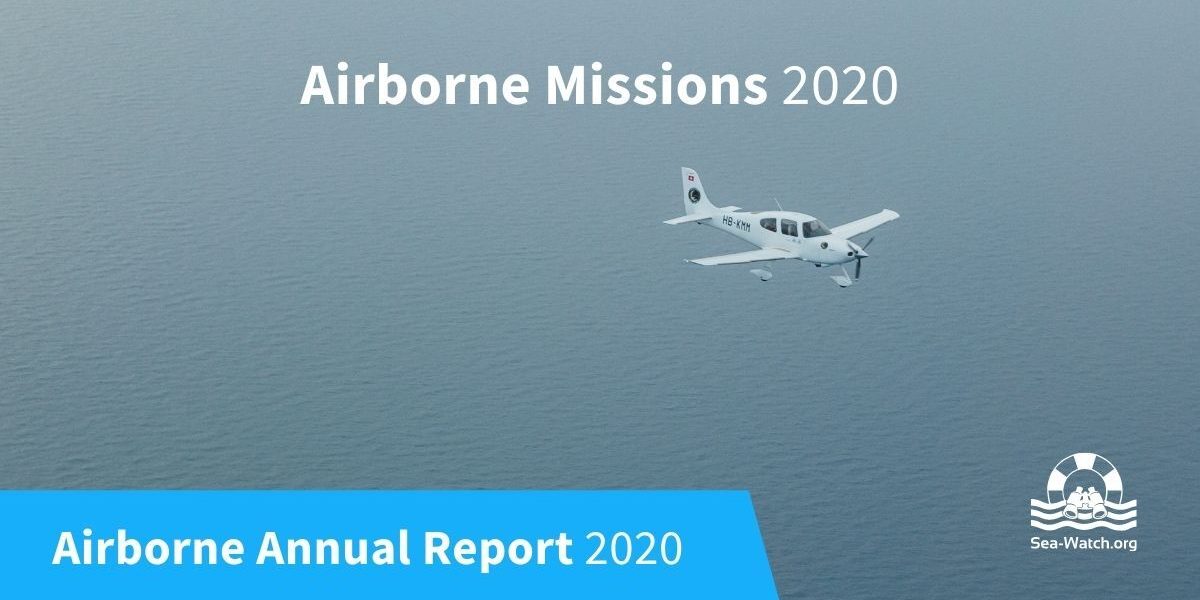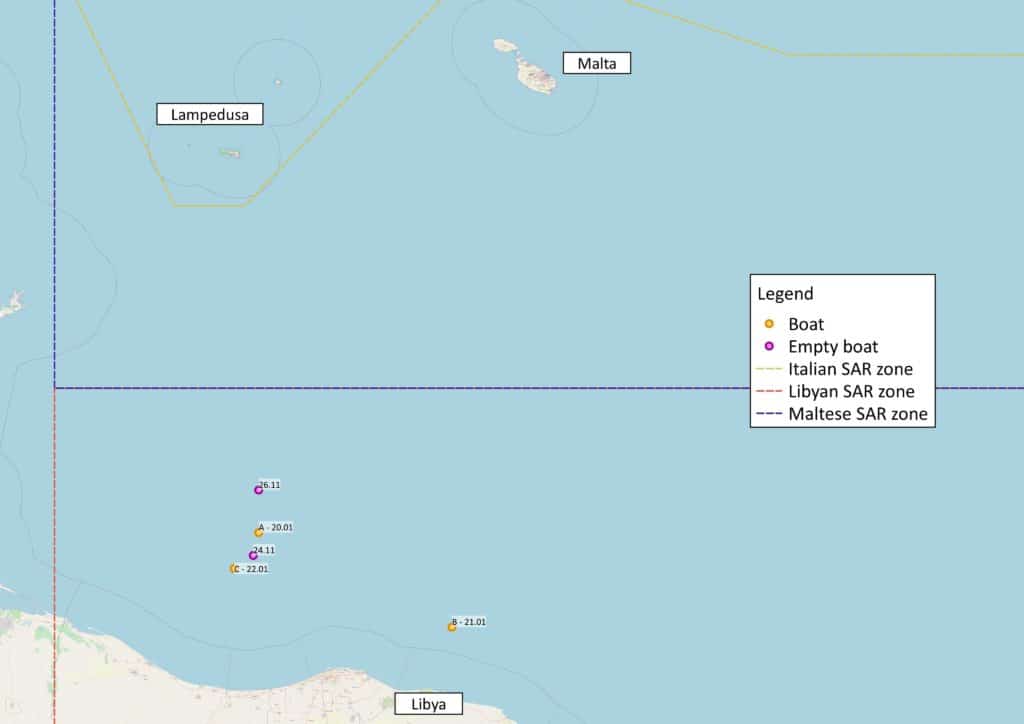This factsheet presents a summary of distress cases witnessed by Sea-Watch’s Airborne crew from the aircraft Moonbird.*
From November 2020 to January 2021, primarily due to bad weather in the Central Mediterranean Sea, we flew only 16 missions with a total flight time of 73 hours and 22 minutes. We spotted around 165 persons in distress and 2 empty boats.
Overview of Distress Cases and Empty Boats Spotted
Libyan Search-and-Rescue (SAR) zone
3 distress cases were intercepted by the so-called Libyan Coast Guard and pulled back to Libya
Estimated** number of persons in distress: 165
*Since 2017, together with the Swiss NGO Humanitarian Pilots Initiative, Sea-Watch monitors the Central Mediterranean with its aircraft Moonbird and more recently Seabird.
**These numbers are based upon the estimations of Moonbird’s crew, as well as numbers which the initiative Watch The Med – Alarm Phone, the UNHCR and IOM have provided to us.
Details and Outcomes of the Distress Cases
20.01.2021, distress case A, 48 persons: interception by the so-called Libyan Coast Guard and pullback to Libya. The initiative Watch The Med – Alarm Phone was called by the people on board and alerted authorities. The civilian aircraft Colibri 2 then spotted the people in the Libyan Search-and-Rescue (SAR) zone, and the NGO vessel Ocean Viking began heading to the boat. Moonbird’s crew spotted the people being intercepted by the so-called Libyan Coast Guard patrol boat Fezzan. The people were pulled back to Libya.
20.01.2021, unresponsiveness of the Libyan authorities regarding a shipwreck and people in distress. According to reports provided to the initiative Watch The Med – Alarm Phone and later confirmed by the IOM and UNHCR, a boat with around 53 persons capsized on 19.01. where only 10 persons survived. When Moonbird’s ground crew attempted to call the Libyan authorities 16 times that day to request more information and offer support in looking for the missing persons, they were unreachable. In 2 cases, an exchange was not possible due to a lack of English. For 1 number the line was occupied, and in 4 other cases the call ended automatically, the phone was switched off or one person immediately hung up. In 9 cases, nobody answered.
21.01.2021, distress case B, 36 persons: interception by the so-called Libyan Coast Guard and pullback to Libya, despite NGO vessel present in the Central Mediterranean. The initiative Watch The Med – Alarm Phone was called by the people on board and alerted the authorities. Moonbird’s crew later spotted the interception of the people by the so-called Libyan Coast Guard patrol boat Ubari, in the Libyan SAR zone. The people were pulled back to Libya.
22.01.2021, distress case C, 81 persons: interception by the so-called Libyan Coast Guard, likely under Frontex supervision. The initiative Watch The Med – Alarm Phone was called by the people on board and alerted the authorities. The civilian aircraft Colibri 2 then spotted the people in distress in the Libyan SAR zone. Meanwhile, Moonbird’s ground crew observed the track of Frontex aircraft Osprey3, which orbited above the persons and then left the scene, first flying towards Tripoli and then back again to the people in distress. We assume that the Frontex aircraft was likely guiding the so-called Libyan Coast Guard to the distress case. In total, according to the observations of Moonbird’s ground crew, Osprey3 orbited for more than 40 minutes above the persons in distress. By the time Moonbird’s aircrew spotted the people in the Libyan SAR zone, Osprey3 had already left the scene and was heading back to its home base. The so-called Libyan Coast Guard patrol boat Fezzan was then only 1 nautical mile (nm)*** away. Moonbird’s crew observed Fezzan intercepting and pulling the people back to Libya.
On 24. and 26.11.2020, Moonbird’s crew spotted 2 empty boats adrift in the Libyan SAR zone, which could not be matched with any known cases.
*** “Nautical Miles” is the unit of measurement used at sea. 1 nautical mile is equal to 1.852 kilometres
These missions highlight once again:
- the deadly consequences of European migration and border policies
- the systematic non-assistance of European Member States and the delegation of rescue operations to the so-called Libyan Coast Guard
- the participation of the European Border and Coast Guard Agency Frontex in the interceptions and pullbacks undertaken by the so-called Libyan Coast Guard
- the need for NGO vessels in the Central Mediterranean in order to uphold the law and save human lives







